BYGONE DAYS OF YORE: 1956 - Apprentice Boys besiege the Maiden City
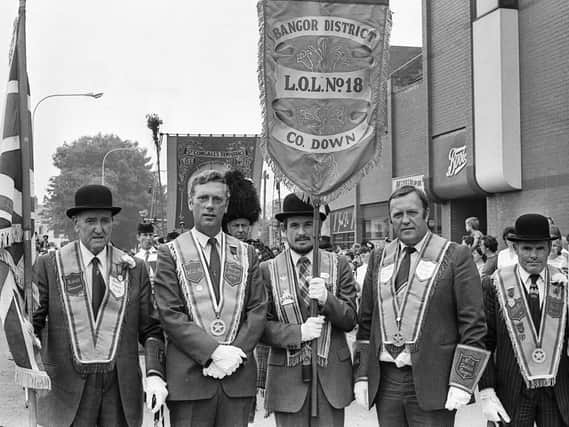

Sixteen special trains were operated to the city by the Ulster Transport Authority (UTA) and the Great Northern Railway (GNR), and there was a total of 350 special buses operated by the UTA.
SCOTTISH CONTINGENT
For the first time for many years there was a strong Scottish contingent in the parade, members of the Govan (Glasgow) Branch of the Mitchelburne Club, who were led by their president, Mr Ronald Cameron. The branch carried their own standard as well as the Scottish standard of St Andrew.
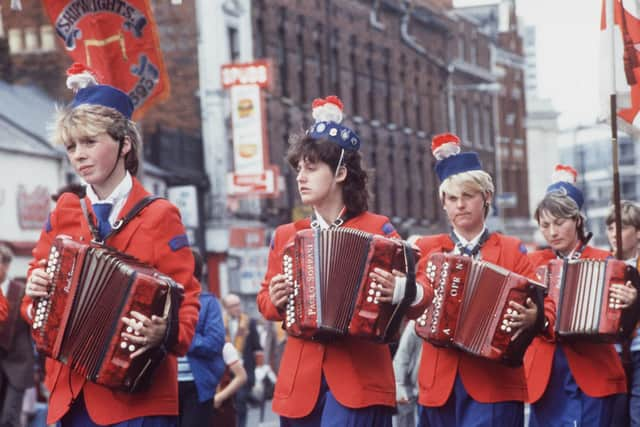

Advertisement
Hide AdAdvertisement
Hide AdFrom early morning the roads to the city and city streets were jammed with traffic, and the police used “walkie-talkie operators” to control the hundreds of vehicles on the move. To alleviate some of the congestion cars were diverted on to the lower deck of Craigavon Bridge, which was normally used by railway wagons being shunted from the UTA to the GNR system.
The three mile route through the city was brightly decorated with bunting and flags. The procession formed at the Apprentice Boys’ Memorial Hall in the morning, and, headed by the Governor, Mr John Campbell, and the Lieutenant Governor, Dr W R Abernethy, marched to The Diamond, where Mr Campbell laid a wreath on the city’s war memorial.
The service in St Columb’s Cathedral was conducted by the Dean Derry, the Very Reverend L R Lawrenson, MA.
The special preacher was the Reverend C Brett Ingram of Drumbanagher, Newry, who, referring to the closing of the gates of the city 1688, declared: “The spontaneous action 13 apprentices saved the British throne. They saved Protestantism in these islands. British civilisation in many lands, and, above all, they ensured liberty for millions then unborn.”
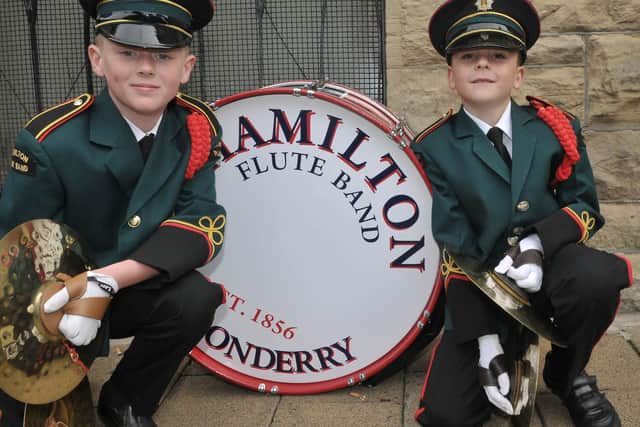

FIRST SHOTS OF AMERICAN INDEPENDENCE
Advertisement
Hide AdAdvertisement
Hide AdMr Ingram’s sermon drew an interesting connection with the American War of Independence (1775-1783) and reminded the congregation of the importance of the actions of the apprentices.
He remarked: “The Boyne was the only battle of European importance fought in this island. Had Derry yielded 18 months earlier there would have been no battle, let alone victory, at the Boyne.
“Every American tourist should make Derry a place of sacred pilgrimage, for it was the grandsons of Derry’s valiant heroes who fired the first shots for American independence, and spearheaded Washington’s army at Lexington and Valley Forge.”
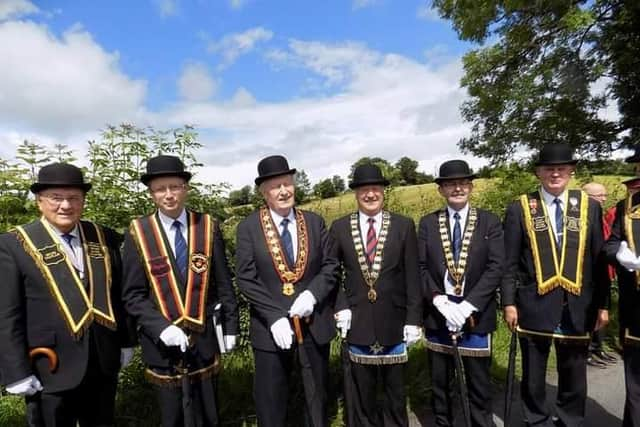

Mr Ingram continued: “We gather in this old Cathedral - the ‘Westminster Abbey’ of Ulster - to thank God for the strong Walls and stronger hearts of 1689 - the most Homeric struggle in man’s story since Ulysses returned from Troy. Their ordeal made Derry Ulster’s mascot. Liberty was their legacy to us. And what a heritage! We have three obligations - to know more about it, to use it more, and to extend it.”
Advertisement
Hide AdAdvertisement
Hide AdHe continued: “Liberty has become so axiomatic of the British way of life that we never pause to consider it, anymore than we would calculate the amount of fresh air we consume daily. We take both for granted. How many could recite the four ‘freedoms’ as listed by that great Protestant, Franklin Roosevelt, fifteen years ago? They were - freedom of speech, freedom of worship, freedom from want, and freedom from fear. Every Protestant should know these four freedoms.”
He added: “Two months ago I heard an Englishman ask: ‘What is this Orange business, and why do you celebrate July 12?’ The Orangeman who replied was well versed and cultured. He told of the Protestant religion, of the colour of the horse, a pinch of theology, and four place names which meant nothing at all to the Englishman - now completely perplexed. I humbly asked to be allowed to answer his question, and here is how I proceeded.
“Every Russian knows he got his freedom (such as it is) by a revolution in 1917. Every Frenchman knows he got his freedom by a revolution in 1789. Every American knows he got his freedom by a revolution in 1776. But Britons are unaware that they, too, got their freedom by a revolution and that that revolution happened in 1690. Boyne Day is Britain’s Day of liberation.
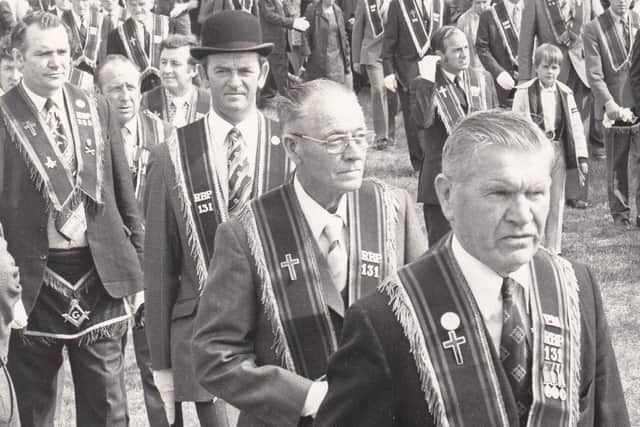

“Here, at least, in this corner of the kingdom we will keep fresh the memory of that revolution which gave us our freedom. And if we have no head for dates, let us know this anyhow about our liberty - it was won by Protestants. We believe liberty is the birthright of every individual on this planet, but the task of liberation has been a Protestant monopoly. No matter what the church allegiance of the men of Derry, their action was essentially Protestant. A Protestant is literally an advocate, and from the very beginning Protestants have been advocating liberty.”
‘FREEDOM BEING UNDERMINED’
Advertisement
Hide AdAdvertisement
Hide AdMr Ingram said that their freedom was being undermined by the very institutions to which it gave birth. “Chief among these was parliamentary democracy,” he said.
He continued: “We have a ‘Protestant Parliament for a Protestant people’. Our enemies say we are biased. Of course we are biased in favour of freedom,” he added.
Mr Ingram said that there were two features of all parliaments which undermined liberty, namely party rule and majority rule.
He remarked: “Party rule is indispensable to our present political solidarity, but it regularly involves conscience-crucifixion. Can liberty survive if man speaks according to his conscience but votes against all he has said in obedience to the Whips? The Whips have put the ‘mock’ in democracy.”
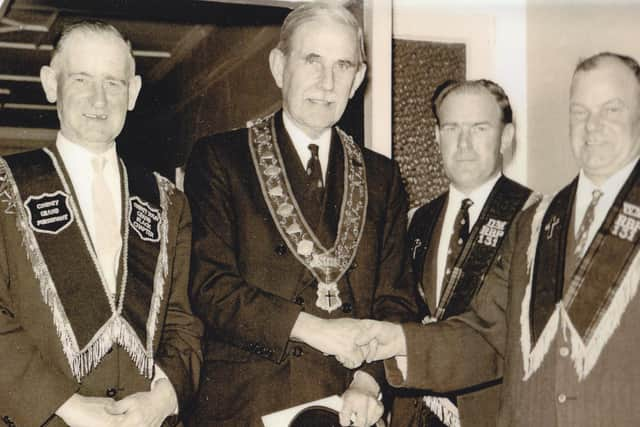

Advertisement
Hide AdAdvertisement
Hide AdAfter the service the main procession of the day was formed, and the 20,000 members of the Order marched along a three mile route through the city and Waterside, ending on the ancient city walls.
SYMPATHY FOR EIRE’S ECONOMIC TROUBLES
Speaking at a Relief of Derry demonstration, held by the County Fermanagh Grand Black Chapter in Lisbellaw in August 1956, Viscount Brookeborough, the Prime Minister of Northern Ireland, declared: “I want to say publicly here that we feel nothing but sympathy for Eire in her difficulties, and we wish her well in her efforts to overcome them.”
The Ulster PM continued: “Events in this island the last few months have justified more than ever before Ulster’s resolve to remain part of the United Kingdom.
“While economic conditions in the south have deteriorated to such extent that drastic action had to taken last month, we in Ulster have been forging steadily ahead towards prosperity.”
Advertisement
Hide AdAdvertisement
Hide AdThe Ulster premier expressed the hope that there would be a new approach to the partition of Ireland “based on the realisation that, though our ways life are poles apart, we can be good friends, each respecting the other, and co-operating in matters of common interest”.
Lord Brookeborough continued: “I was glad to observe recently a note of realism sounding out in southern statements about the border, realisation that 35 years of blowing the anti-partition trumpet has not brought down the walls of Ulster - in fact it has not even dislodged a single stone in them.
“Perhaps we may hope that...there will come the knowledge that wild words of propaganda do them more harm than us.
“Meantime I say to you members of this great institution, you have a noble tradition to live up to. Our fathers bequeathed to us the priceless heritage of civil and religious liberty. That heritage is in safe hands while it remains in your keeping, but it calls for more than vigilance, more than unity in our ranks; it requires also that you keep this state of ours viable and prosperous.
Advertisement
Hide AdAdvertisement
Hide Ad“Let us forward towards that prosperity together. Government and people, proud of our great heritage and confident in the knowledge that our future is secure within the framework of the United Kingdom and the British Commonwealth.”
CHURCH SERVICES HELD ARMAGH AND TYRONE
The News Letter also noted this week in 1956 that the Archdeacon Armagh, the Venerable R W S Maltby, was the preacher at the annual Royal Black Preceptory Relief of Derry service in St Macartan’s Cathedral, Clogher. Meanwhile, the Reverend G Chart, Keady, conducted the anniversary service of Glenagearagh LOL 908 in Glenhoy Presbyterian Church, Augher. The anniversary service promoted by Clabby Defenders RBP 1157 in Clabby Methodist Church, Fivemiletown, was conducted by the Reverend D J Allen, superintendent of the circuit.
The service organised by Rehaghey RBP 57 and LOL 857 at Rehaghey Orange Hall, Aughnacloy, was conducted by the Reverend C WD Kerr, Clonaneese.
ORANGE SERVICE IN GROOMSPORT
The landing of the Duke of Schomberg at Groomsport 267 years previously was commemorated in the Co Down village in August 1956, when a service was held in Groomsport Presbyterian Church by the Schomberg’s True Blues LOL No 589, Groomsport. Brethren from Bangor, led by the Ballyholme Brass Band and the Clelland Memorial Pipe Band, paraded from Bangor to Groomsport for the service. The Reverend Walter Nelson conducted the service, assisted by Canon C H Walsh, rector of Groomsport. The special preacher was the Reverend A S Hoffmaster, Belfast.
Read more
Comment Guidelines
National World encourages reader discussion on our stories. User feedback, insights and back-and-forth exchanges add a rich layer of context to reporting. Please review our Community Guidelines before commenting.